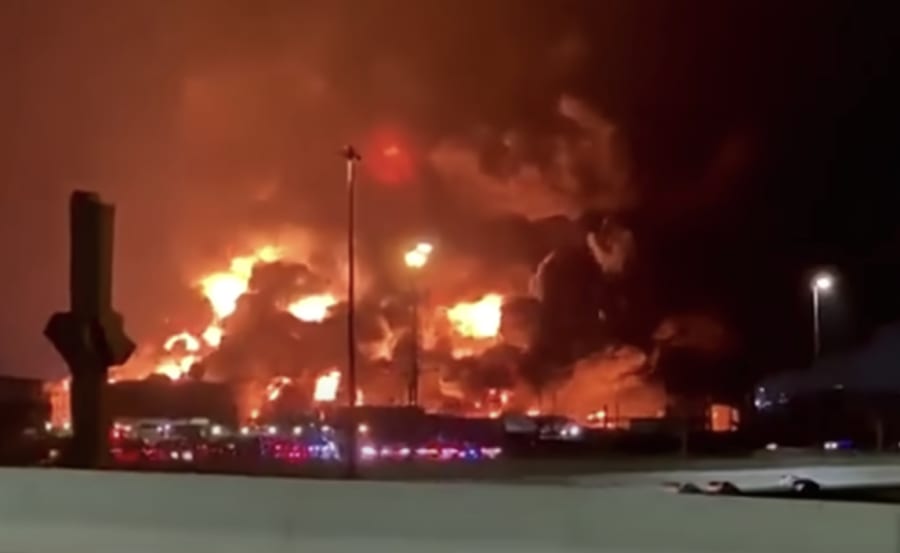As concerns over Iranian escalation grip region, Israeli Prime Minister Bennett issues rare condemnation for Houthi attack in Saudi Arabia
Show of Israeli public support for Saudis comes as summit in southern Israel draws four Arab nations, US

In a rare statement on such events, Israeli Prime Minister Naftali Bennett on Saturday condemned the latest attack by the Iranian-backed Houthis on Saudi Arabia’s oil facilities.
Bennett said the attack points to Iran as a regional threat and warned against removing Tehran’s elite Islamic Revolutionary Guard Corps from the U.S. State Department’s Foreign Terrorist Organization (FTO) list.
“The State of Israel expresses its sorrow to the Kingdom of Saudi Arabia after the horrific attack by the Iranian-backed Houthis. This attack is further proof that Iran’s regional aggression knows no bounds & reinforces the concern of Iran’s IRGC being removed from the FTO list,” Bennett tweeted.
The Houthis, a terrorist organization based in Yemen, said they used a “large number” of drones in an assault on the Aramco oil facility in Jeddah. The Saudis – without acknowledging the attack – said they intercepted one ballistic missile and 10 bomb-laden drones, Saudi state-run TV channel al-Ekhbariya reported.
NEW - #Houthi strike just hit an #Aramco facility in #Jeddah, on the eve of the #SaudiArabia Grand Prix.pic.twitter.com/nRKYAvk2y7
— Charles Lister (@Charles_Lister) March 25, 2022
The Friday attack marked seven years of Houthi insurgency against the Saudi-led Arab military coalition supporting the formal Yemeni regime.
While no casualties were reported, fears remained high that further attacks could affect the Saudi Arabian Formula 1 Grand Prix competition taking place over the weekend. However, Formula 1 organizers insisted that the race would take place despite the latest Houthi attacks on adjacent oil facilities.
“Following the widely reported incident that took place in Jeddah on Friday, there has been extensive discussion between all stakeholders, the Saudi government authorities and security agencies who have given full and detailed assurances that the event is secure," Formula 1 said in a statement.
U.S. Secretary of State Antony Blinken, who is in Israel for a regional summit, condemned the attacks.
"At a time when the parties should be focused on de-escalation and bringing needed life-saving relief to the Yemeni people ahead of the holy month of Ramadan, the Houthis continue their destructive behavior and reckless terrorist attacks striking civilian infrastructure," Blinken said.
U.S. National Security Advisor Jake Sullivan accused the Houthis of regional terrorism.
“Saudi Arabia and the Yemeni government have endorsed multiple UN [United Nations] calls for ceasefires and de-escalation over the last year. The Houthis have rejected these calls, responding instead with new offensives in Yemen and terrorist acts, such as those launched against Saudi Arabia last night,” Sullivan said.
However, at the same time, the Biden administration appears to be soft-pedaling in its controversial nuclear negotiations with the Iranian regime, the paymaster of Houthi attacks and a leading sponsor of regional and global terrorism.
Countries like Saudi Arabia, the United Arab Emirates and Israel fear that Iranian-sponsored terrorism would escalate if Washington decides to remove the Islamic Revolutionary Guard Corps (IRGC) from its Foreign Terrorist Organization list.
Iran’s IRGC, and specifically its Quds Force, is widely considered to be the leading player behind terrorism throughout the Middle East and beyond. The late Quds commander, Qassem Soleimani, built an extensive network of regional terrorist proxies such as Hezbollah in Lebanon, the Houthis in Yemen and pro-Iranian militias in Syria and Iraq.
However, the ayatollah regime has reportedly still not agreed to Washington’s conditions for removing the IRGC from the terrorist list. In return, the Biden administration wants Tehran publicly committing to de-escalation in the Middle East.
While Saudi Arabia has still not normalized its diplomatic relations with Israel, there are growing covert ties between the two Middle Eastern countries, which both view Iran as the main regional threat. However, the Saudi government has signaled that it is prepared to establish diplomatic ties with Jerusalem in the future once there is peace between the Palestinian Authority and Israel. In addition, Riyadh has allowed Israeli commercial planes to access Saudi airspace on the burgeoning air routes between Israel, the United Arab Emirates and Bahrain.
In a high-profile address of shared regional concerns, the Jewish state is hosting a “historic diplomatic summit” with U.S. Secretary of State Antony Blinken and the foreign ministers of Egypt, Bahrain, the United Arab Emirates and Morocco. The two-day summit begins today.

The All Israel News Staff is a team of journalists in Israel.














